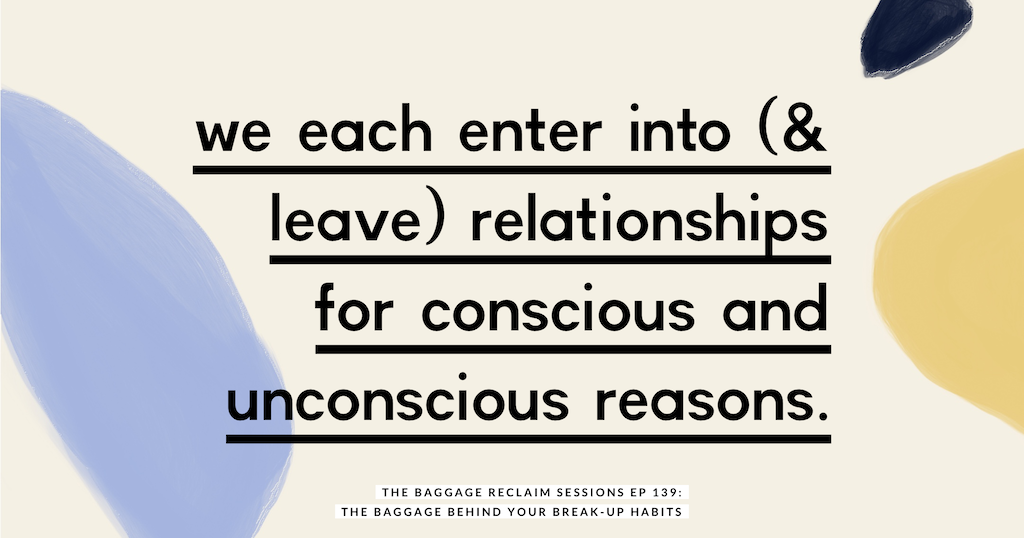So many people are perplexed by their break-up habits, often wondering what’s wrong with them or why others find it so ‘easy’ (they don’t). It’s like they’re kicking themselves for skipping the class at school that they never had. What so many of us don’t realise is that we learn about how to break up in the classroom of life: our experiences and observations. In this week’s episode of The Baggage Reclaim Sessions, I explain the factors that contribute to our current (and past) break-up habits and responses. Understanding why we don’t know how to break up and why we end relationships (or avoid ending them) in the way that we do is pivotal to moving forward.
Subscribe on Apple Podcasts | Spotify | Android
Some nuggets from the episode:
- If you don’t know how to leave, you don’t know how to stay. If you stay for the wrong reasons, you tend to leave for the wrong reasons, too.
- Existing habits including people pleasing, perfectionism, overthinking, over-empathy etc., may have precluded us from having the self-esteem to be the one to:
- Initiate a break-up
- Take care of ourselves in response to being broken up with, or to
- Honour what we wanted [if we initiated]
- There’s plenty of people who never initiate break-ups. It’s like I would still be in all of these relationships if it weren’t for the fact that they ended it. I’d still be there no matter what. Um…, where’s the discernment?
We each enter into (& leave) relationships for conscious and unconscious reasons.
- What we do out of habit significantly influences our relationship and break-up responses. It’s only through pain and problems that we become aware of where we need to adapt and break patterns.
- Associations = mental link that we make between things.
- We have underlying concerns that influence why we’re resistant to breaking up or why we break up in the way that we do. Break-ups open up old wounds.
- Associations mean that there will be some (or a lot of) underlying concerns. I don’t want…
- To hurt or abandon this person (or be hurt or abandoned).
- Who I am to be rejected (or to reject him/her).
- To be ‘back there’ again.
- To be wrong. What if I’m wrong about him/her? What if I miss out on their change?
- To trigger rage [in this person or whoever they represent]. Or, I don’t want to trigger my own rage. We’re remembering ours (or someone else’s) behaviour.
- To be in control/out of control.
- To take the next step or move on to the next stage of my life.
- People to dislike me. Or, I don’t want to like myself.
Where did I get these ideas? Where did I learn to think, feel and behave in this way during or after a break-up?
- It’s not just our association buttons that get pushed; the other party’s get pushed, too.
- If we keep telling ourselves the same things about break-ups or we keep acting the same way about them, then, of course, we keep feeling the same way. We double down on the beliefs and associations. The baggage gets saved up for the next relationship or suitable experience where it will yet again be challenged.
When you consider breaking up, or you make the decision or are broken up with, it’s not just a break-up to you; it’s whatever you associate with breaking up.
- Parents are irreplaceable. If how we feel when we are in a romantic relationship or a break-up is very similar to how we felt in the past with a parent or primary caregiver, then that person who we’re now feeling it with is going to feel irreplaceable.
- We have an unmet need represented by a far-out fantasy. The ‘happy ending’ is righting the wrongs of the past, saving ourselves, or saving someone else. This is why a painful break-up might feel as if we’re being given up on or giving up.
It’s no wonder break-ups can feel so traumatic. We end up feeling all of our losses and hurts all over again!
- The reasons why we struggle to break up have more to do with the past than it does to do with the present.
- Write down your memories, sayings—your associations—for break-ups, disappointment, rejection, loss. You will begin to understand what drives your break-up responses.
- You might be thinking, Natalie, I can’t see the link between a partner/ex and their parents/caregivers/siblings or someone else significant from my past because, in your eyes, this person doesn’t look or act like them. Or, you can’t recall a like-for-like situation. Yes… but you feel as you did around that person from the past.
Links mentioned
- Fear of sacrifice, loss and being trapped (ep.132)
- What’s the baggage behind it? (ep. 2)
- Tidying up emotional baggage (ep. 125)
- The Lean Period (ep. 137)
Please subscribe and/or leave a review on iTunes (how-to guide here) – it really helps in growing the show! If you’re new to podcasts, find out more about what they are and how to subscribe with this guide.
Listener questions can be emailed to podcast AT baggagereclaim DOT com and if there’s a topic you’d love me to talk about, let me know!
Nat xxx

 Add to favorites
Add to favorites 
